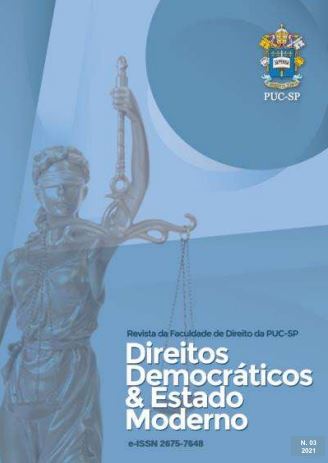Democracia representativa e crise de legitimidade: a necessidade de revalorização do ato de governar
DOI:
https://doi.org/10.23925/ddem.i3.53553Palavras-chave:
Representatividade, Democracia, Povo, Revaloração do ato de governarResumo
Primeiramente, para adentrar ao tema foi feita uma análise da concepção de povo como titular do poder político em suas diferentes concepções, tratadas a partir da teoria de Fredrich Müller. Ao final da análise, foi possível constatar que muitos governos se autoproclamam democráticos e utilizam a palavra “povo” para legitimar o seu mandato. No segundo capítulo, houve a exposição dos pensamentos de alguns autores sobre a aparente crise de representatividade instaurada na sociedade, tais como: Paulo Bonavides; Lenio Luiz Streck e Hans Kelsen. Neste contexto, foi possível vislumbrar que a ausência de mecanismos suficientes acaba corroborando para que a vontade do povo não seja efetivamente representada pelos eleitos. No terceiro capítulo, foram apontados os fatores que contribuem para o descompasso do sistema representativo com a vontade do povo, tais como: a corrupção na política, infidelidade partidária e exclusão social. Ao final, foi verificado que a sociedade vive em um momento de apatia política, assim, o que se apresenta como crise de representatividade na verdade pode ser traduzido na necessidade de uma revalorização do ato de governar.
Referências
BADIOU. A. The Meanig of Sarkosy. Londres: Verso. 2008.
BAHIA, Alexandre, NUNES, Dierle. Crise da Democracia representativa – Infidelidade partidária e seu reconhecimento judicial. 2010. Revista Brasileira de Estudos Políticos, Belo Horizonte, n. 100, p-57-84.
BRASIL. Constituição (1988). Constituição da República Federativa do Brasil. Brasília, DF: Senado, 1988.
BONAVIDES, Paulo. Ciência política. 22. ed. São Paulo: Malheiros, 2015. p. 293.
IBGE. Instituto Brasileiro de Geografia e Estatísticas. Disponível em: https://www.ibge.gov.br/estatisticas/sociais/populacao Acesso em: 03/03/2021.
DALLARI, Dalmo de Abreu. Elementos de teoria geral do Estado. 25. ed. São Paulo: Saraiva, 2005.
KELSEN, Hans. Teoria Pura do Direito. Tradução João Baptista Machado. 6ª ed. São Paulo: Martins Fontes, 1998.
KERCHE, Fábio. Ministério Público, Lava Jato e Mãos Limpas: Uma Abordagem Institucional. 2018. Lua Nova, São Paulo, 105: 255-286, 2018. p. 257.
MANIN, Bernard. As Metamorfoses do Governo Representativo. Revista Brasileira de Ciências Sociais. nº 29, pp. 5-34. Artigo está disponível em: https://www.scielo.br/scielo.php?script=sci_nlinks&ref=000153&pid=S0011-5258200800020000800009&lng=es. Acesso em: 03/03/2021.
MORGENSTERN, Flávio. As manifestações de 2013 e 2015. Disponível em: Gazeta do Povo ,2015, https://www.gazetadopovo.com.br/opiniao/artigos/as-manifestacoes-de-2013-e-2015-1rhul4sm8kfwb7e3u6nwu3xeo/ Acesso em: 03/03/2021.
MPF. Ministério Público Federal. “Operação Lava Jato”. Disponível em: http://www.mpf.mp.br/grandes-casos/caso-lava-jato/entenda-o-caso. Acesso em 03/03/2021.
MÜLLER, Friedrich. Quem é o povo? A questão fundamental da democracia. Tradução de Peter Naumann. São Paulo: Max Limonad, 2003.
OLIVEIRA, Leandro Corrêa de. O que é isto, a crise de representatividade? Breves reflexões acerca da (difícil) relação entre legislação e jurisdição? Constitucionalismo e Democracia. Reflexões do Programa de Pós-Graduação em Direito da FDSM. Pouso Alegre. 2018. P. 199-223.
RIBEIRO, Flávia. Direito Eleitoral. 5ª ed. Rio de Janeiro: Forense, 1999, p. 47.
ROUSSEAU, Jean-Jacques. O Contrato Social. Tradução de Antônio de Pádua Danesi. São Paulo: Martins Fontes, 2001, p. 37-38.
SANTOS, Kátia Paulino e MANAJAS, Arley Felipe. Democracia e corrupção no Brasil: a face tirana do poder político. Estação Científica (UNIFAP). Macapá, v. 2, n. 1, p. 11-24, jan. /jun. 2012. p.12.
SANTOS, Boaventura de Souza. Estamos em uma transição da democracia para a ditadura? Política. Porto Alegre. 2017. Disponível em: https://www.redebrasilatual.com.br/politica/2017/06/boaventura-de-sousa-santos-estamos-em-uma-transicao-da-democracia-para-a-ditadura/. Acesso em 03/03/2021.
STF. Ação direita de inconstitucionalidade. 4650. Disponível em: http://portal.stf.jus.br/processos/detalhe.asp?incidente=4136819. Acesso em: 03/03/2021.
STRECK. Lenio Luiz. Ciência Política e Teoria do Estado. Porto Alegre. 8ª Edição. Livraria do Advogado.2014.
TSE. Tribunal Superior Eleitoral. Eleições 2018: Justiça Eleitoral conclui totalização dos votos do segundo turno. Disponível em:<http://www.tse.jus.br/imprensa/noticias-tse/2018/Outubro/eleicoes-2018-justica-eleitoral-conclui-totalizacao-dos-votos-do-segundo-turno>. Acesso em: 03/03/2021.
ZIZEK, Slavoj. Primeiro como tragédia, depois como farsa. Boitempo editorial. 2011. São Paulo.
Downloads
Publicado
Como Citar
Edição
Seção
Licença
Copyright (c) 2021 Direitos Democráticos & Estado Moderno

Este trabalho está licenciado sob uma licença Creative Commons Attribution 4.0 International License.

Este obra está licenciada com uma Licença Creative Commons Atribuição 4.0 Internacional.
Revista DD&EM - ISSN 2675-7648
















